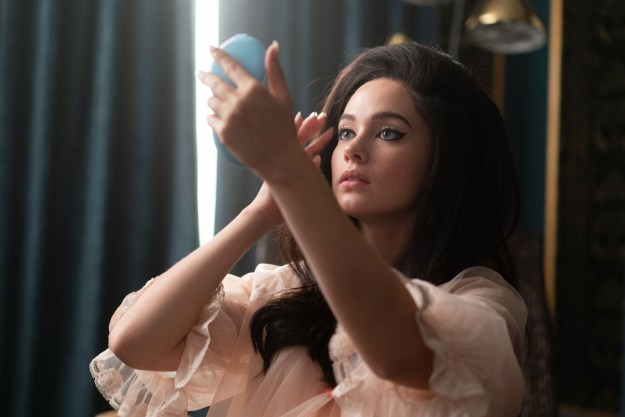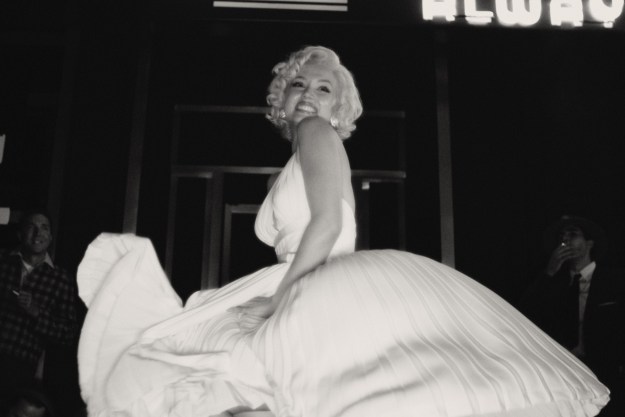
“With Priscilla, Sofia Coppola again revels in the cosmetic trappings of a sentence in the dollhouse.”
- It's emotionally intelligent
- It's beautifully made
- Cailee Spaeny delivers a touchingly naturalistic performance
- It's a touch repetitive
- Coppola has explored these themes before
At 25 and 5’1″, Cailee Spaeny is at once older and shorter than the character she plays in Sofia Coppola‘s latest daydream of fame and fortune as a captive state. It’s the stature we notice. “She’s like a little girl,” someone says of Priscilla Beaulieu, a teenager swept into the glamorous life of an adult superstar. In reality, Elvis Presley had 10 years, but only six inches on her. Priscilla exaggerates the height disparity to emphasize the age gap. Placed next to all 6 feet, 5 inches of Jacob Elordi, this Priscilla truly looks like a child. Which, of course, is what she was when she met the King just 14 years into her life.
Their first encounter was in West Germany in 1959. He was stationed there a couple years into his military service. She was an Army brat. A friend of Elvis spotted her at a café and offered to take her to a party to meet the biggest star in the world — an invitation that looks suspiciously like a scouting mission. “She’s a lot more mature than her age,” Presley would later tell Priscilla’s parents when they asked why a grown man of his renown was pursuing their daughter, a ninth-grader. It’s the kind of thing adults say when they’re seducing children.
Priscilla arrives one year after Elvis, Baz Luhrmann’s frenetic biopic jamboree, which took the wide view of its subject’s life and career, trying to capture decades of cultural impact across a few hours. There, the future Mrs. Presley was played by Olivia DeJonge, confident and bubbly in a performance brief enough to be called a cameo. Luhrmann seemed to take the notion that the two were kindred spirits united by loneliness at face value. Coppola, director of such portraits of restless youth as The Virgin Suicides and Somewhere, is more interested in the fundamental imbalance of their relationship — the inequities created by age and gender and the sheer weight of supernova stardom.
The early scenes have some of the dreamy melancholy of her breakthrough, Lost in Translation, another film about an older man and a younger woman meeting in a country that’s not their own, and bandaging their mutual homesickness with a sexless romance. Elordi’s Elvis is all aw-shucks sincerity — downtuning his charm to Priscilla’s adolescent wavelength, doing a kind of intimate, acoustic rendition of his magazine appeal. The Aussie actor isn’t a dead ringer for the real Presley, but like Austin Butler, he’s channeling more than imitating. In silhouette, the illusion is convincing. Coppola plugs us into the allure of Elvis without using much of his music — a neat trick, that.

“Promise you’ll stay the way you are now,” he says to his sweetheart, right before leaving her in a crowd of screaming fans and flying back to the flashbulbs of Hollywood and Nashville. Two years pass before he’ll unfreeze her with his attention again. It’s the girl’s innocence he covets and fetishizes, her youth he wants to put behind glass like a gold record. Coppola, forever attuned to the itchy desires of girls caged by luxury, contrasts Priscilla’s blossoming sexuality with the King’s obsession with her purity. He wants a doll, not a lover; he reserves his own libido for the various co-stars and celebrities he beds on the side.
You could call this the anti-Elvis, both in its narrow, subjective focus — the antithesis of Luhrmann’s Wikipedia revue — and its refusal to indulge a mythic perspective on Elvis himself, who’s portrayed as an emotionally absent control freak. Drawing from her subject’s memoir, Coppola follows an arc of awakening, as Priscilla grows from blushing child bride to discontent trophy wife, the tractor beam of showbiz attraction gradually weakening as the fairy tale wears off. Coppola doesn’t rush that dawning awareness. Part of the shrewd emotional intelligence of Priscilla is how it frames the courtship through the girl’s besotted eyes while letting us see how much of a teenager she really was. Spaeny resists all temptation to take Presley’s complimentary remarks as direction, to play Priscilla too mature or worldly, too wise beyond her years.
Like Coppola’s Marie Antoinette, she falls into an arranged marriage of sorts (“I’ll handle that,” Elvis promises any time the matter of parental permission comes up), and is whisked off to an American palace, the Southern manor of Graceland. She is always or never alone — left to dangle like an ornament during the long months when Elvis is shooting or touring, then surrounded by his Memphis Mafia boy’s club when he’s home. One might think, too, of Princess Diana whenever the in-laws are tightening the proverbial blinds and warning of the eyes watching beyond the gates. The tragedy of the story is of someone swallowed by her proximity to fame; she can only be an accessory to the giant she’s married — a beautiful extension of his star power.

The elegant interior decoration, the gorgeous dresses, the cars and downright designer pets lavished as gifts — as usual, Coppola revels in the cosmetic trappings of a sentence in the dollhouse. And in literal cosmetics, too — the film opens in media res with Priscilla applying makeup in close-up, and only later doubles back to give us the full absurd context of her preparations, a beauty regimen foisted upon someone whose every life experience has become a PR opportunity or public spectacle. You almost have to wonder if this material is too good a fit for Coppola. There’s no friction between Priscilla’s confining dream life and the director’s general preoccupation with wealth as a cage, explored in almost every similarly poetic drama she’s made before this one.
And for all the ways Priscilla functions as an inverse of Elvis, the two movies arguably succumb to the same deflating upshot — the inevitable crumble into the bad times. The film’s final stretch is a sustained blur of unhappiness, a slow-motion comedown. Priscilla, waking from the dream that consumed her childhood, finally sees her life for what it’s become: a decadent bubble of boredom and loneliness, free of agency. At a certain point, the audience may feel trapped in that bubble with her, and just as eager to get the hell out of Graceland.
Priscilla is now playing in select theaters; it opens wide on Friday, November 3. For more of A.A. Dowd’s writing, please visit his Authory page.
Editors' Recommendations
- Sofia Coppola’s movies, ranked worst to best
- Slash/Back review: The kids are all right (especially when fighting aliens)
- Operation Seawolf review: nice Nazis? No thanks!
- Werewolf By Night review: magnificent monster mayhem
- Vesper review: an imaginative sci-fi adventure




